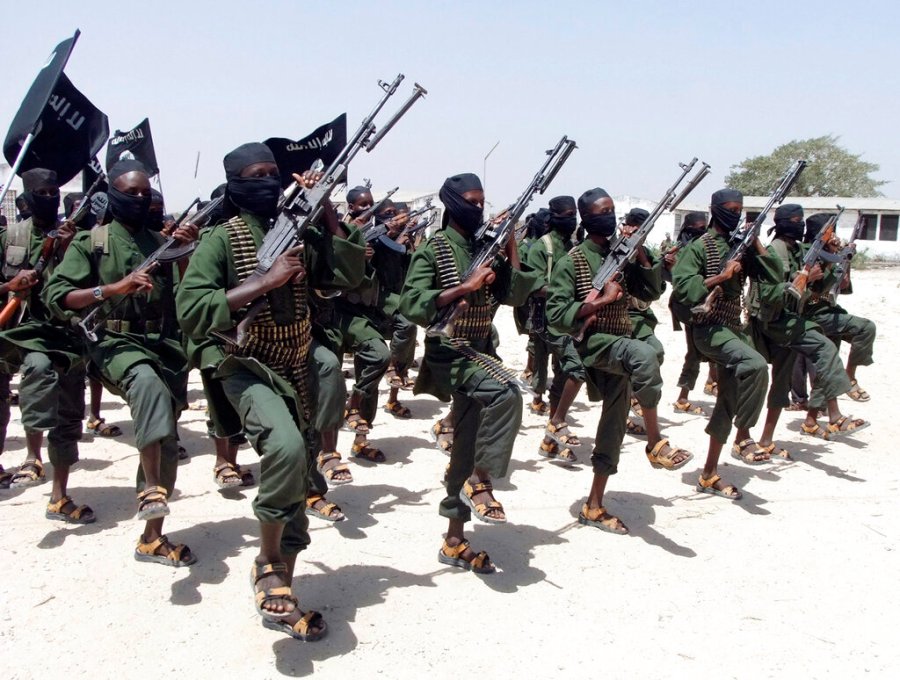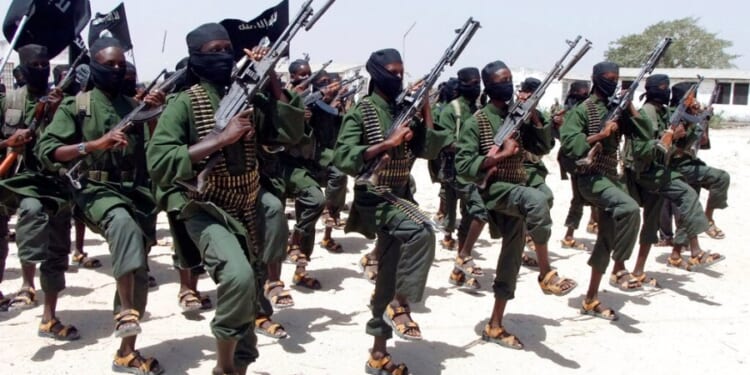
We have seen this movie before with the Taliban in Afghanistan. Now its sequel is playing out to devastating effect in Somalia.
Al-Shabaab — a Salafi Jihadist confederation — is rapidly securing terrain and closing in on Somalia’s capital city of Mogadishu. The militant group is seizing key locations in the Middle and Lower Shabelle coastal region on both sides of the city.
For decades, the U.S. and African Union have sought to keep the government of Somalia afloat, but time is running out. Al-Shabaab is making a push to capture Mogadishu and establish a Sunni caliphate in East Africa.
“We see the evidence of an [Somali] army in disarray and in retreat,” said Matt Bryden, a co-founder of the research group Sahan. “People in Mogadishu also are beginning to fear the government is not capable of securing the city and that there’s a chance of al-Shabaab fully encircling or possibly … overrunning the city.”
Contributing to this growing fear was a bomb blast on March 18 that narrowly missed the passing convoy of President Hassan Sheikh Mohamud.
This has the making of another Sunni-Muslim terrorist group overthrowing a U.S. supported government. The fall of the government of Somalia would provide al-Shabaab a foothold in the Horn of Africa.
Somalia has been unstable now for decades. For many Americans, the movies “Black Hawk Down” and “Captain Phillips” are their only knowledge of the country. The battle in Mogadishu took place in October 1993 and the hi-jacking of the Maersk Alabama took place in 2009.
Warlords and clan leaders battling for power in ungoverned spaces were replaced by a weak and ineffective central government, then challenged by Islamic terrorists and pirates from Puntland.
In October 2002, the Combined Joint Task Force – Horn of Africa was established in Camp Lejeune, N.C. to counter the piracy threat.
Initially operating from the USS Mount Whitney in the Gulf of Aden, it moved ashore to Camp Lemonnier, Djibouti in May 2013 and has assumed a broader mission to conduct operations to enhance partner nation capacity, promote regional stability, dissuade conflict and protect U.S. and coalition interests.
Fast-forward to March 2025. The fall of Mogadishu would further threaten commercial and military shipping in the Gulf of Aden, Arabian Sea and the Indian Ocean from the shores of East Africa. Houthi rebels already present similar threats from Yemen, adding the Red Sea — and access to the Suez Canal — to the equation.
These are the same critical trade routes that Secretary of Defense Pete Hegseth justified use of force prior to multiple strikes against Houthi rebels in mid-March, stating “Freedom of navigation is basic; it’s a core national interest.”
That narrative was validated in the Signal chat scandal that rocked Washington last week. Trump’s National Security Advisor Mike Waltz wrote, “It will have to be the United States that reopens these shipping lanes … we have a fundamental decision of allowing the sea lanes to remain closed or to re-open them now or later, we are the only ones with the capability unfortunately.”
Hegseth responded that it felt like “now is as good a time as any, given [the president’s] directive to reopen shipping lanes.”
But does that include al-Shabaab in Somalia? Apparently, yes.
U.S. Africa Command began striking targets in Somalia in February. Targets included Islamic State-Somalia operatives in the Golis mountains in Puntland, a semi-autonomous area in northern Somalia. In March, U.S. forces also targeted al-Shabaab.
There is connective tissue between Islamic State-Somalia, al-Qaeda and al-Shabaab. Al-Shabaab and Houthi rebels have direct ties to Iran. As we warned earlier, Tehran has been shopping for new proxies now that Iran-backed Hamas and Hezbollah have been significantly degraded.
Iran has long aspired to shut down the Red Sea, and al-Shabaab could be the missing ingredient.
In June 2024, U.S. intelligence learned of discussions by the Houthis to provide weapons to al-Shabaab. It is believed Houthi rebels established a weapons agreement with al-Shabaab, and that likely did not happen without Iran’s approval.
Somali Prime Minister Hamza Abdi Barre knows that. He met with high-level Iranian officials while in Baghdad in July 2024 in an attempt to persuade the Houthis not to support al-Shabaab over the Somali government.
For al-Shabaab, it would provide access to new sources of weapons including drones and possibly ballistic missiles that are far more sophisticated than their current arsenal. Weapons purchased by al-Shabaab from Iran would also present a threat to the Somali government and nearby U.S. forces in the region.
Al-Shabaab’s financial muscle, underestimated for decades, is fueled by “three main sources,” as Middle East Institute scholar Guled Ahmed put it: “extortion, illicit activities and investments.” In his recent book, “al-Shabaab Mafia Inc.“, Ahmed estimates the group’s income at $2 billion annually.
But the threat runs deeper than that. As the U.S. tries to broker a ceasefire agreement between Ukraine and Russia – Reuters reported in September 2024 that Iran had brokered secret talks between Russia and Yemen’s Houthi rebels to transfer anti-ship missiles to the militant group to shut down shipping in the Red Sea. These are likely the same missiles used to attack the USS Harry S. Truman aircraft carrier and her escorts last week.
If so, Russian President Vladimir Putin is working directly against Hegseth’s stated U.S. “core national goal” of freedom of navigation. Essentially, Putin’s gambit is, “Team Trump watches my back, while I stab theirs.”
It is embassy watch time again, and all eyes are on the U.S. Embassy in Mogadishu for signs of continued American commitment to stability in Somalia. During the Biden administration, U.S. embassies in Afghanistan, Sudan and Niger were evacuated. Will Team Trump maintain a presence in Somalia?
In mid-March, reports surfaced that the U.S. Embassy in Mogadishu began pulling staff out of Somalia because of the increasingly unstable situation. But according to a March 16 post on the Embassy’s X account, “Recent reports that the U.S. Embassy in Mogadishu has begun withdrawing essential staff are false.”
Somalia has become a national security interest — again. ISIS-Somalia, al-Qaeda and al-Shabaab represent a “clear and present” danger to the government of Somalia, international shipping lanes and U.S. forces in the region. Houthi rebels, Iran and Russia are their enablers.
It is time for the Trump administration to address al-Shahaab’s enablers. Attacking the symptom will not cure the disease.
Col. (Ret.) Jonathan Sweet served 30 years as an Army intelligence officer. Mark Toth writes on national security and foreign policy.











